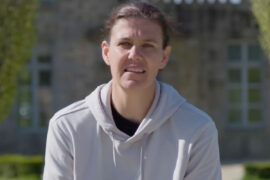Canada is on the path to reconciliation, but we need to work together to move forward, according to Edward (Sonny) Albert, community liaison for Norway House Cree Nation. During the 2021 Petro-Canada Sport Leadership sportif Conference, Albert outlined three steps that sport leaders can take to build relationships with Indigenous communities and to keep the momentum going.
“I was asked to explain the Truth and Reconciliation Commission’s Calls to Action and how we can ignite a flame. I’d like to focus on the five Calls to Action that pertain to sports and recreation, which are sections 87 to 91,” Albert said during his session presentation.
“As sports leaders… how do we move forward? I came up with three very simple actions so that we can start to understand… When you listen to our stories, share opportunities and continue to tend the fire that’s been created [it means] we’re inching closer to reconciliation in one of the best ways possible, which is together.”
LISTEN: Go deeper in the understanding of your athletes, coaches and volunteers. Understand where they came from, where they’re at and how both your organization and Indigenous communities can benefit in a meaningful way. Listening will go a long way and you’ll understand where the barriers of participation come from as well as the difficulties and perceived excellence not only in sport, but of integrating into western society. [The stories] are not always the same, but you’ll understand why action is needed for Indigenous people.
SHARE: We’re all fighting for resources to support the work we do. [When we] support [Indigenous] athletes, along with Indigenous-led initiatives, we all become successful. [But if] we lose sight of the people who will one day take over, we’ve lost ourselves. Include Indigenous ancestry in your registration and collaborate with local leaders. This can go a long way in educating the public and our athletes, and can increase excellence in sport by promoting and identifying our role models. Sharing takes many shapes, for example, to share your purpose, to share with other partners and organizations, to share the respect [you have for] participants for their pace of learning, and to share knowledge and information with those who want to make a difference.
STAY: Many times, we have seen organizations, groups and researchers come and go, which [creates] excitement. But what about after? [How do we] preserve the fire that has been created? There are ways to sustain programs to ensure that we maintain our flame [by providing] resources, bringing in your partners, finding champions and ultimately creating identity and ownership within the community. Now, this does not happen overnight. There will be times of doubt and uncertainty, but providing physical activity for our people’s well-being goes a long way to reducing barriers—it increases the drive to continue and we feel included.
Edward (Sonny) Albert is the community liaison for Norway House Cree Nation, one of the largest Indigenous communities in Manitoba. He has worked with the Manitoba Aboriginal Sport and Recreation Council as the Aboriginal Sport Consultant and has extensive experience with the North American Indigenous Games as an athlete, coach, contingency staff and community supporter, from 2002 to 2020.
The Petro-Canada Sport Leadership sportif Conference took place virtually November 3–5, 2021. Conference delegates can view recordings of most sessions for 30 days after the conference. Click here to learn more.




